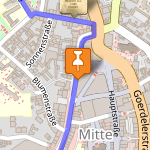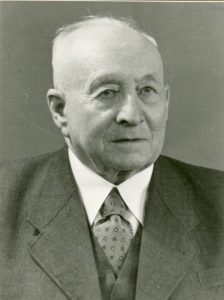Stop 6: Emil-Kronenberg-House
Mummstraße 10 – go to map – go to starting point
As can be read on an information board, the building that houses Solingen’s city library and “Volkshochschule” (an education centre, mostly for adults) was named after Dr. Emil Kronenberg anno 2004 – far from being a coincidence. Mr. and Mrs. Kronenberg shared a broad interest in culture. Prior to 1914, Adele Kronenberg became actively involved in the “Verein Jugendschutz” (“Association for Youth Protection”). In the 1920s, she contributed to the Committee on Public Welfare in the city of Solingen and also became active for Solingen’s emergency aid in 1929. Emil Kronenberg was part of the “Solinger Lesegesellschaft” (“Solingen Reading Society”) which had been founded in 1894 and which, in 1896, started hosting lectures from poets, researchers and scholars. He was a strong advocate of a „Volkshochschule“ run by the city of Solingen.
The first local “Volkshochschule”, initiated by Emil Kronenberg and financially supported by an association for adult evening classes, successfully operated between 1912 and 1918. Afterwards, at the time of the Weimar Republic, Solingen’s municipal “Volkshochschule” was founded in 1919. Dr. Emil Kronenberg was a member of the municipal Committee on Education and also contributed to the Committee on Health.
In the meantime, the „Solinger Lesegesellschaft“ was continually amplifying its stock of books and journals. In early 1926, Solingen’s city library was brought into being, once again initiated by Dr. Kronenberg, and could take on the Reading Society’s stock of 3,000 books.
After the National Socialists had seized power, Emil and Adele Kronenberg had to give up their entire volunteer work and all of their honorary offices.
Starting in late 1941, Emil Kronenberg worked as the last “Sachbearbeiter des Büros Solingen” (“Clerk at the Solingen Office”) of the “Reichsvereinigung der Juden” (“Reich Association of Jews”). On 1 February 1943, the confiscation of all of his assets “for the benefit of the German Reich” was decreed but not performed. He was deported to Theresienstadt on 17 September 1944, together with the remaining Jews that also lived in so-called “miscegenation”. After the liberation, Emil Kronenberg returned to Solingen on 1 July 1945. He represented the newly founded “Freie Demokratische Partei” (“Free Democratic Party”) in the municipal Committee on Culture. He died in 1954, almost 90 years of age. His urn was laid to rest on the Protestant cemetery at Kasinostraße, next to his wife who had died in 1943.

